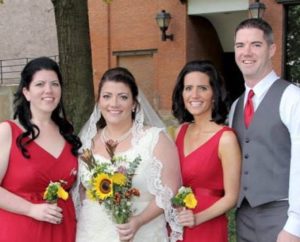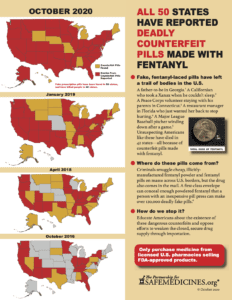In Florida, a beloved wife, daughter, sister, aunt was felled by fake oxycodone

Maggie with her siblings at her wedding in 2014
On the evening of September 1, 2016, in Wellington, Florida, 34-year-old restaurant manager Margaret Di Vita Crowley took a single oxycodone pill she had purchased from an acquaintance to deal with her chronic back pain. She died almost instantly of furanyl fentanyl poisoning.
Maggie, born Margaret Di Vita, was the second of four siblings who grew up in a tight knit Italian-Catholic family in Fair Lawn, New Jersey. Her younger sister Caroline remembers Maggie as a bright personality, ”a little firecracker,” a big music fan and a steadfast, loyal, exuberant person.
“She was a great friend. She always traveled to all her friends’ bachelorette parties, and their weddings—to New Jersey, Louisiana—this one’s kid was born, this one was graduating from her master’s program...She was at everything. She was always at everything. She was always present.”
Maggie was also very generous, her older sister Kristen adds, “She always helped other people…if someone’s kid was doing something like a fun run, even if she didn’t have much money she’d still donate five bucks.”
After a childhood in Fairlawn, Maggie attended St. Bonaventure University in New York State with Kristen. She majored in journalism and mass communications and after a stint working for a country radio station in New York, she took a job with Outback Steakhouse. She met her husband, Shaun, in Rochester and in 2014 they married and moved to Florida. Maggie was close to her family. She spoke to her siblings frequently, talking her brother, Joe, through buying his first house, and sharing stories with her sisters almost every day. She was also a good aunt, spending long hours with Caroline’s young sons, buying them gifts, and taking them swimming and on outings.
Florida suited Maggie, except for one thing: in her late 20s, in New York, Maggie had fallen at a concert and hurt her back. She had several medical procedures and doctors prescribed her oxycodone so that she could continue to work at her active job. When Maggie and Shaun relocated, she found that Florida’s rules around dispensing opioids were stricter. Doctors prescribed her tramadol rather than oxycodone, and—because it was not as effective for her—Maggie ran through her monthly pills too quickly. When she ran out she turned to buying painkillers from Kevan Slater, a coworker.
A Tragedy No One Expected
Disaster came out of the blue. Caroline spoke to Maggie via Facetime the day she died, and their conversation was normal: “She was fine. She was with it. She was cooking in the kitchen and she showed my children her cat.” Maggie texted her later, at about 7:30 pm, but when Caroline texted her back after she had put her children to bed, she received no reply.

Around 11:15 pm, Shaun called and delivered brief, devastating news, “Car, Maggie’s dead.” Stunned, Caroline couldn’t believe that this was true. She hung up the phone and called a cousin who lived near Maggie, saying, "You have to go to Maggie’s house. Shaun is saying she’s dead, but I’m sure she’s just asleep and he can’t wake her up.” When the cousin arrived, the coroner was already there. Caroline was left to make tearful calls to her shocked siblings, who gathered for a long, terrible night at their parents’ house.
Later, Shaun told the Di Vitas what had happened. He had come home from work around 9 pm, hungry, and found Maggie alert and awake, but lying in bed. She told him her back had been hurting, but offered to take him to dinner, saying that she would be ready to go after a quick shower. When the 10 o’clock news came on he realized that he had not heard Maggie moving around upstairs. He found her on the bed in a position that suggested that she was stretching her back, but she was not moving. He lifted her face up, and saw that it was blue. 911 told Shaun to try to suppress her tongue to clear her airway, but it was stiff. The police came. They made him wait downstairs until the coroner’s office removed Maggie, covered, on a gurney.
Maggie’s death coincided with Hurricane Hermine, which made landfall in Florida on September 2. Many flights were cancelled, and it was a week until Shaun was able to bring his wife home to her family. Maggie’s funeral was well-attended. Her parents’ house was flooded with food, flowers, and baskets, and many people–extended family, teachers, friends, counselors—gathered for her sister’s wake and funeral.
A month later, when Kristen and her husband joined Shaun to painfully sort through Maggie’s things, she found that her sister was as loved in Florida as she had been in New Jersey. “One of the kids who worked for her made me a necklace, a locket with her name on it, [one for] me, my father and my mother. They had a candlelight vigil for her with hundreds of people...She had done even more in her life than I had realized.“
A Surprising Cause of Death, and a Federal Investigation
For the Di Vitas, the circumstances of Maggie’s death were a mystery. Investigation yielded allergy medication and a bottle of prescription pills with no label. Maggie’s family believed she had died of an accidental overdose. In December, however, they received an autopsy report that listed the cause of Maggie’s death as fentanyl poisoning.
They learned nothing more until October 2017, when Dr. Johnny Benjamin, Jr., an orthopedic surgeon in Vero Beach, Florida, was arrested for manufacturing and selling counterfeit oxycodone pills made of furanyl fentanyl. He made the drugs with supplies he purchased on the internet, including a pill press and M30 oxycodone die mold on eBay. Law enforcement traced the “oxycodone” pills that killed Maggie to Kevan Slater, who sold her the pills, through a middleman, Zachary Stewart, and finally back to Dr. Benjamin. In an October 16, 2017 criminal complaint Benjamin displayed no conscience about Maggie’s death, telling Stewart that Crowley was “just another ‘page in a large stack.’” Slater and Stewart, who were Drug Enforcement Agency informants charged in the case, pleaded guilty and will be sentenced in June. On April 27, 2018, a jury found Dr. Benjamin guilty of five charges related to the possession and distribution of fentanyl. In July, Dr. Benjamin was sentenced to life in prison.
When we spoke to her, Caroline hoped to testify in court as a character witness for her sister. “When people hear that someone died from drugs,” she told us, “they don’t care. They think they deserved it. They think they were some druggie behind a Walmart injecting themselves. And I’ve probably been guilty of falling into that…but when it happens to someone who was a great aunt, a good wife, a hard worker, and someone that you know, I feel that instead of them just saying, ‘oh, a young women, a middle-aged women died,’ it would be nice if we could give a face to her name.”
Remembering Maggie Di Vita Crowley
 A guilty verdict, no matter how just, will not bring Maggie back. The Di Vitas organize a donation drive to a different charity every year for Maggie’s birthday, but it cannot ease their loss. “The things where it’s the five of us and there should be six, it’s physically painful,” Kristen told us. “I personally have retreated a lot. Our family is very, very close, and I think my parents take comfort in having us around, but at the same time it’s difficult because there’s always someone missing.”
A guilty verdict, no matter how just, will not bring Maggie back. The Di Vitas organize a donation drive to a different charity every year for Maggie’s birthday, but it cannot ease their loss. “The things where it’s the five of us and there should be six, it’s physically painful,” Kristen told us. “I personally have retreated a lot. Our family is very, very close, and I think my parents take comfort in having us around, but at the same time it’s difficult because there’s always someone missing.”
Contemplating the impact of this tragedy on their family, Caroline shared that her brother is haunted, knowing that his children will never know Maggie. She lingers on her sons, now eight and six, who had trouble taking their aunt’s death in. “Is it true, what mommy told me?” they asked a cousin at the time. “Does she have her cell phone on her? Can we FaceTime her in heaven?” Caroline says that her sons put drawings in their aunt’s casket, and wrote letters they tied to balloons, imagining that Maggie would see them. “They’re okay. They’re getting better,” Caroline says, “Sometimes if I let them see me cry, they’ll say to me, ‘You miss Aunt Maggie, don’t you?’ and tell me that I’ll see Maggie again, in heaven.”

Maggie Crowley's sister Caroline spoke to PSM about her sister and about the prosecution of Dr. Benjamin.
Fake pills are killing Americans in all 50 states.
 Read about victims and about the fentanyl and pill presses that killed them.
Read about victims and about the fentanyl and pill presses that killed them.